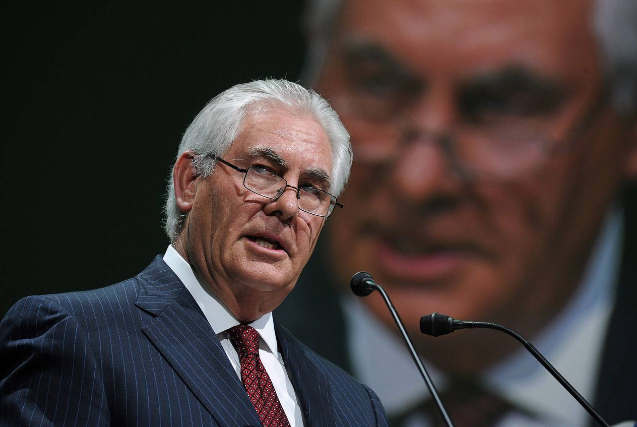Media Report

- The Wall Street Journal reports: "A top challenge for Rex Tillerson as Donald Trump's secretary of state would be navigating the U.S.'s sensitive relationship with Beijing. On at least one flashpoint, the South China Sea, he has some familiarity. Under Mr. Tillerson's leadership, Exxon Mobil Corp. waded into one of the region's thorniest diplomatic disputes when it signed a deal with Vietnam seven years ago to drill for natural gas, partly in waters also claimed by China, drawing Beijing's ire and garnering attention from U.S. officials...Mr. Tillerson flew to Beijing in the middle of the row, meeting with oil-company executives including the chairman of China National Offshore Oil Corp., which controlled the rig at the center of the dispute. Neither companies have provided details on what was discussed...the company's venture in Vietnam 'creates some friction,' with China, said Victor Gao, formerly a Chinese Foreign Ministry official who also was a top executive at state-owned oil company Cnooc Ltd. He said Mr. Tillerson should 'start from a fresh page.' "
- The Washington Post reports: "Any change in U.S. policy favoring formal recognition of Taiwan will 'seriously' damage peace and stability across the Taiwan Strait and undermine relations between Beijing and Washington, a Chinese government spokesman said Wednesday...Spokesman An Fengshan said breaching the one-China principle 'will seriously affect peace and stability across the Taiwan Strait. The one-China policy is an important political foundation for relations between China and the U.S.,' An told reporters. 'If such a foundation is disturbed or undermined, there can be no talk of a healthy and stable development of U.S-China relations.'...[Trump's actions are] placing him perilously close to touching on China's bottom line that brooks no formal recognition of Taiwan or challenge to its claim to sovereignty over the island. China's response has thus far been fairly muted, mainly blaming Tsai for placing the call."
- The New York Times reports: "The commander of United States military operations in the Asia-Pacific region said on Wednesday that America's commitment to the region would continue after Donald J. Trump became president, as would its opposition to Chinese expansion in the South China Sea. 'You can count on America now and into the future,' Adm. Harry B. Harris Jr., head of the United States Pacific Command, said in a speech at the Lowy Institute, a research center in Sydney, Australia. He said that 'reports of America's abandonment of the Indo-Asia-Pacific have been greatly exaggerated' and called the area 'the most consequential region for America's future.'...Admiral Harris declined to speculate on how United States policy might change after Mr. Trump takes office next month, saying he was 'not in the business of giving advice to the president-elect.' But he said America's interests in the region were 'enduring' "
Calendar
- 2016-12-13 China’s richest man’s threat to Trump: 20,000 US jobs are at stake “should things be handled poorly”
- 2016-12-12 A new China emerges on trade battlefield
- 2016-12-11 Trump Suggests Using Bedrock China Policy as Bargaining Chip
- 2016-12-09 China Faces Off Against World on Open Global Markets
- 2016-12-08 Trump’s Chinese Currency Manipulation
- 2016-12-07 Trump picks Iowa Gov. Terry Branstad — a ‘friend’ of China’s leader — as Beijing ambassador
- 2016-12-06 China Seeks ‘Strategic Composure’ in Trump Era of Diplomacy
- 2016-12-05 Trump, Taiwan and China: The Controversy, Explained
- 2016-12-04 Trump Camp Scrambles To Defend Diplomatic Blunder Over China And Taiwan
- 2016-12-02 China Seizes Opening in U.S. Backyard as Trump Upends Policy
News
- The Washington Post China Warns Trump Ignoring One-China Policy Could Hurt Peace
- The Wall Street Journal For Tillerson, South China Sea Storms Aren't New
- The New York Times No Change in U.S. Commitment to Asia-Pacific Under Trump, Admiral Says
- Reuters China Leaders Convene for Key Economic Meeting: Xinhua
- The Financial Times China Warns of Anti-Monopoly Penalty for the U.S.
- The Wall Street Journal Zinc Rally Driven by Demand for Better Cars in india and China
- Aljazeera Chinese Muslim Website Blocked After Xi JinPing Letter
- Reuters China Tells Japan it Opposes Unilateral North Korea Sanctions
- The Financial Times US Pacific Commander Reassures Allies They Can 'Count on America'
- The Associated Press China to Seek Extradition of 200 Arrested in Spain for Fraud
- The Telegraph China Rescues 36 'Infants' From Child Traffickers
- BBC China 'Space Capsule' Experiment Ends After 180 Days
- The New York Times Pageant Silences Beauty Queen, a Critic of China, at U.S. Contest
Commentary
- China File Inside and Outside the System: Chinese WriterHu Fayun
- Brookings An Open Letter to Donald Trump on the One-China Policy
- The New York Times: Sinosphere For China's State Media, Trump Victory Can't Cure the 'American Disease'
- Forbes GM China Said To Be Under Antitrust Investigation -- AWarning For Trump?
- Bloomberg View Pinpointing the Bubble in China's Real-Estate Market
- Council on Foreign Relations What Trump Means for China
